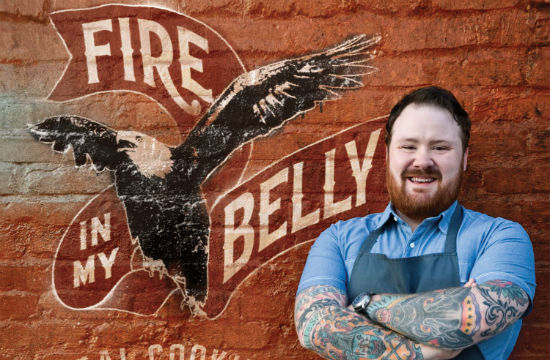Kevin Gillespie On His New Book, Top Chef, And The Real Story Behind His ‘Pig’ Tattoo
Kevin Gillespie finished Top Chef’s sixth season in third place behind the Voltaggio Brothers, but he was crowned Fan Favorite, and won more than any other cheftestant had to date. For these reasons, and probably also because Padma Lakshmi and Gail Simmons both counted him among their all-time favorite Top Chef competitors from the past ten seasons, Kevin doesn’t really feel like he lost anything.
He’s the executive chef of the Woodfire Grill in Atlanta, and has finally birthed a book baby in the form of his very first labor of literary love: a cookbook entitled Fire In My Belly. (To remind you of how much cooler than you he is, Kevin’s back cover blurbs are penned by Sean Brock, Daniel Boulud, Joe Kwon of The Avett Brothers, and his mom.)
We caught up with Kevin smack in the middle of his book tour (for which he was grateful; had it been a week later, he confessed, he would have been a zombie) to hear all about his food mission, his real-life life after Top Chef, and — bonus! — the real story behind his pig tattoo, which is remarkably Ron Swanson-esque. We promised him we’d evangelize the tale to clear up all the pork-related misconceptions. Needless to say, we were swiftly reminded of why Kevin was such fan favorite material. Check out our Q & A below.
Tell us about your new book!
This book is something that’s taken me a number of years to put together, but it’s one that I’m really happy with because I think that it addresses the largest issue that I’m seeing in cookbooks at the moment, which is that we’re targeting the wrong audience a lot of the time. I think that most professional chefs nowadays are writing books that, though very inspiring, are not helping people gain the confidence that they need to go into the kitchen and learn to cook. And so I wanted to write a book that would not only provide them with the information, help them learn, but would also get them excited about it. And I use my own personal experiences in life and those stories to show my own excitement in an attempt to get other people excited in that same way.
What other problems do you find with other, more conventional cookbooks on the market right now?
Well, I think that more often than not, we approach it from an idea that the only people who are interested in cooking, in fact, are people who are already good enough cooks, and I don’t necessarily believe that. I’ve actually been made aware many times in the recent past that there are a lot of people in this world who consider themselves foodies, who are interested in food, who are excited about food, but maybe they grew up with a mom who worked and so she didn’t teach them how to cook, or maybe they grew up in a scenario where they just never had to develop that skill. And it doesn’t mean that they haven’t developed a love for food — they just don’t really know where to begin. And by that same token, when they go and they look at books that are sort of targeted towards beginners, they’re very remedial, and they’re not exciting, and so it doesn’t do what it needs to do to get people in the kitchen.
Instead, I took the approach of writing a book that was still exciting, still had a lot of really fun and interesting dishes in it, but it was very explanatory. Everything that I’m asking you to do, I’m also explaining why you need to do it. And I do that because I think that helps people learn.
So we recently spoke to both Padma Lakshmi and Gail Simmons about some of their favorite Top Chef-testants from the past ten seasons and both of them fondly identified you, and both of them, separately, without knowing the other one said it, confessed that she thought you went home too soon. Do you agree?
No, not at all, actually. That’s very gracious of them to say that and I really appreciate it. They’re both very sweet women, and I respect them dearly. I don’t feel like I went home too soon at all, and the reason is that I’m probably the only competitor in the history of Top Chef who was not trying to win. And I say that meaning that it’s not as if I was attempting to not win. What I mean is that I sort of set an agenda for myself in the very beginning that my mission while on Top Chef was going to be to cook food that I believed in, and tell the story of that food to further the mission that I was undertaking. And that mission was to open people’s eyes about a certain belief set that I feel very strongly about, [which is] being cognizant of where you source your food from and being cognizant of the fact that all dishes should be able to connect people and tell them a story and bring them together and fill them with comfort and passion. And so I’ve used Top Chef as a platform to do just that. And I feel like I was very successful at doing it.
Making it all the way to the end — whether I won the last episode or not — I felt was kind of irrelevant, because I felt very successful in doing what I had come there to do. Mix that in with the fact that the reality is that, if you want to count french fries, I won more than anyone in the history of the show ever has, so I don’t really feel like I didn’t win. When you take both of those two things together, I think that everything worked out the way it was supposed to.
Do you think that clearly defined food mission of yours had anything to do with you being such a fan favorite?
I hope so. I think everyone involved in that show was able to see very clearly that I was not acting, that I was genuine, and that I was not there to win by all means necessary. As a matter of fact, I was only willing to play the game under my very specific terms, and I think that was probably refreshing. Because, with all the seasons that they’ve done, people tend to get very cut-throat and very bitter, purely for the sake of winning, and I think that winning is a misconstrued term. Because what exactly is winning? Winning, in my mind, was not taking home that final prize money. Winning was having the ability to share what I love with millions of people, and have them connect with what I love. And hopefully, moving forward, maybe they asked a few more questions about the food that they eat. Maybe they visited me. Maybe they’ll buy this book, and they’ll learn even more about me and my story, and their love for food, as well.
Is there a food trend playing out in restaurants right now that you’re over?
That’s a hard question for me. I’m not usually much of a hater, so let me think about that for a moment. I don’t know if this is so much a trend, though I feel like it’s happened a lot recently. I have absolutely nothing against molecular gastronomy, at all. I have nothing against the modern food movement, at all. On the other hand, I’m…concerned that a lot of younger chefs are choosing style over substance. And one thing that I’m “over” — though I was never really into it in the first place — is people sacrificing sound cooking techniques and really smart flavors and thoughtful dishes, and substituting in place of that [dishes] that test people’s limits. And maybe they fail in a lot of the classic ways that we consider food successful, but they look really cool. I just feel like that’s not something that can last for a very long time. Because, in my mind, great cuisine has always been rooted in the fundamentals of flavor and satisfaction, and if the dish doesn’t serve both of those, then it doesn’t really matter how cool it looks or how interesting it is. It’s still a failure.
You chose your words very carefully, there.
Like I said, it’s hard for me to answer questions like that, because I’m just not much of a person who criticizes others. I have very strong feelings about things, and I’m very clear about how I feel. I’ve also been very cognizant to remain open to new things because I don’t assume that I know the right way to do everything. I assume that I know the way I know to do everything. And I hope that, in time, as I grow, some of those feelings are replaced by different ones.
As I said, my concern is that I’m not currently seeing a ton of chefs — and I’m not saying all of them — but I’m not seeing a lot of people who are embracing the fact that you can still modernize or move a cuisine forward and test boundaries while remembering the basics. You have to be rooted in something. And if you lose the scope of that, you tend to just go off on a path that doesn’t really work. And it’s not lasting. More than anything, it just won’t last. The test of time will eventually prove that it was flighty.
Will you tell us the story behind one of your tattoos?
Sure! I’ll tell you the one about the pig tattoo that I have. Everybody loves that tattoo. What’s funny is that everybody’s like, “Oh you have a picture of a pig!” In fact, I have a picture of a wild boar, which is a little different. And I think a lot of people assume I have a picture of a pig because I love cooking pork. In actuality, my entire left arm — the tattoos are all based on memories of The South. And they came about when I moved away from The South. When I moved to the West Coast, I truly never believed that I would return to Georgia, or maybe even to The South at all. And so I got a bit wistful, and I started making a tribute [sleeve]. I started getting these tattoos that were all inspired by my memories of The South.
And so the boar that’s on my left arm is inspired by a time that I went camping with some friends of mine when I was young, I was probably 13, we’ll say. And we went camping with two of my friends and one of my friends’ dad. And we were deep in the mountains of North Carolina and we were in a cabin that his family had owned for 100+ years. So it was a very basic, no power, no gas, just a basic one-room cabin in the mountains, and it had an outhouse. And so if you needed to go to the bathroom in the middle of the night, you had to go out to the outhouse. But you also had to take a shotgun with you because there’s a ton of wild boar in that area, and they’re very, very aggressive. And so you needed to do this for your own protection.
So in the middle of the night one night, I had to use the restroom. I went, I was sitting in the outhouse, and all of a sudden, I could hear something kind of scurrying outside, and I got a little freaked out, and then a couple seconds later, something started ramming the outhouse, like, banging on the side of it. And I could tell by the sound it was making that it was a boar. And so I sat there, scared to death, waiting for it to go away. And eventually it stopped, and eventually I didn’t hear anything. So I got the shotgun, I got enough courage up to make a run for the front door of the cabin, which was probably 30 yards away from the outhouse, maybe more.
And so I took off through the night, it’s pitch black, running towards the cabin, and just before I get to the edge of where the cabin is, I have this sense that something is right behind me. And so I turned around and I just fired blindly into the night. And, as it turns out, that boar was chasing me and he was right behind me. So I turned around and I shot him and probably saved myself, in all reality, from being gored to death by a wild boar, because he was really big.
And so my friend’s dad came running out, flashlights and everything, and they saw it. It was only a few feet from where I had turned around. It was obviously a very traumatic experience, but it was also one that was so very clearly solidified in my memory that it seemed like it should inspire a tattoo.
Have a tip we should know? tips@mediaite.com







